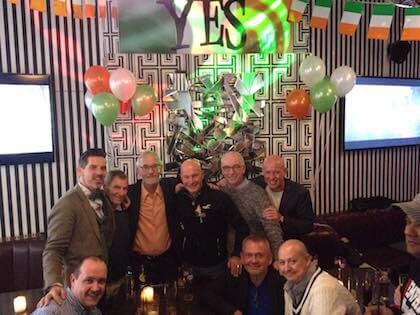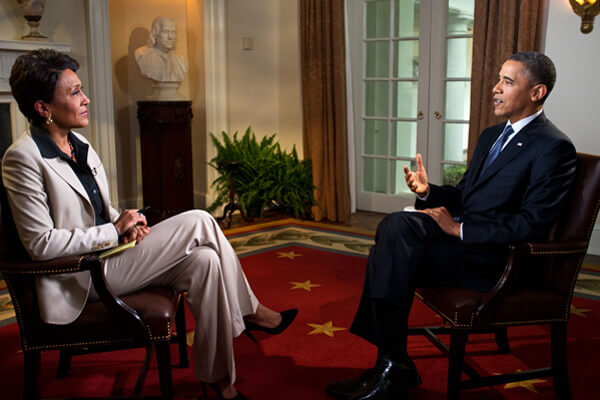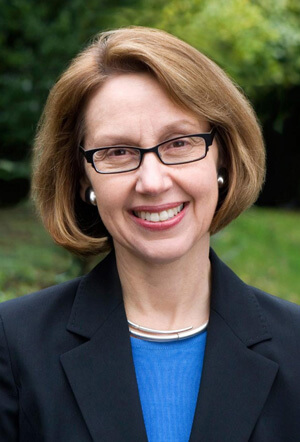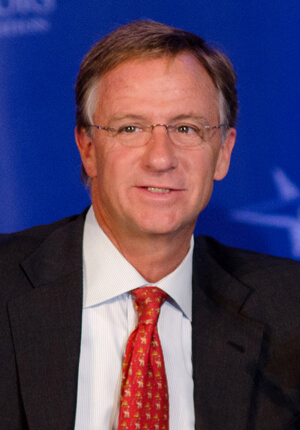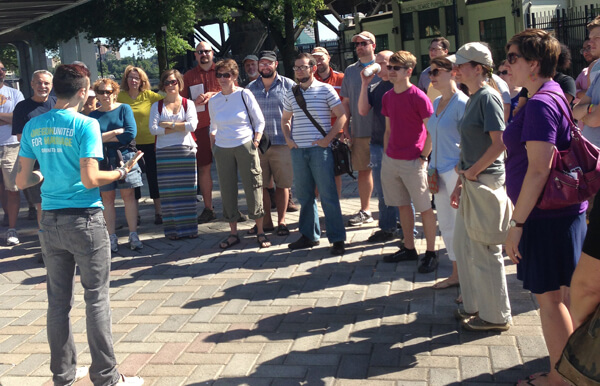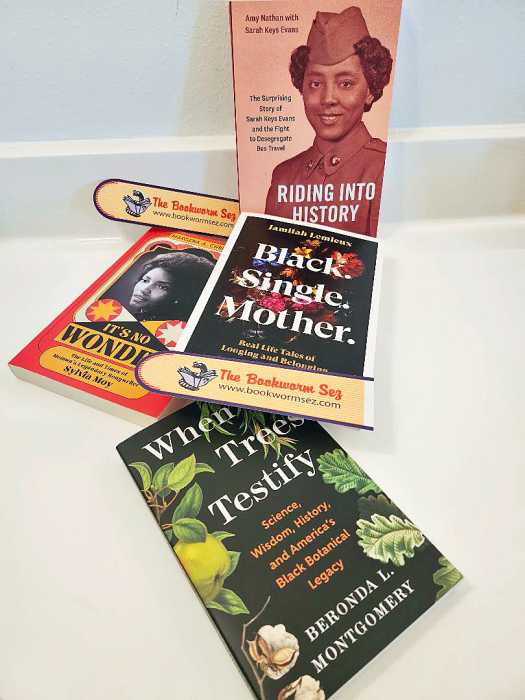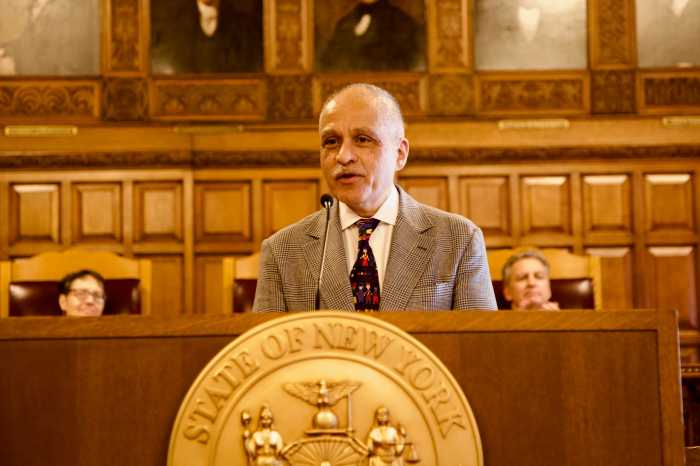Father Bernárd Lynch.
In the December 1918 election, the Irish republican party Sinn Féin won a landslide victory in Ireland. On January 21, 1919, the party formed a breakaway government (Dáil Éireann) and declared independence from Great Britain. Today, by voting to open marriage to same-sex couples, Ireland has chosen independence from the Roman Catholic Church.
Although still Catholic, the majority of the Irish people have voted that the freedom to love transcends their deepest religious beliefs. This marks a seismic shift in the mind of the nation. This consciousness serves not only the LGBT community but the entire people of Ireland in their long and arduous struggle for justice and co-equality among all their citizens.
As LGBT people, we had been robbed of our birthright: our absolute right to live and love as co-equals in our families, churches, towns, villages, and the country of our birth. Many of us left our homeland not for work and employment or for education –– as the Irish have done for centuries by the millions –– but simply because those of us who are LGBT were not welcome. Ireland up until now failed to honour its own Constitution in not “cherishing all her children equally.”
Results announced by the Irish government show a 62-38 percent margin of victory that swept across all demographic and geographical segments of society
But, Friday, May 22, 2105, this changed forever. We have broken the shackles of our colonial past and our colonial governance by the Roman Catholic Church. We are free at last to live and love as we were born to be. For freedom –– not happiness –– is the precious stone. One cannot cling to happiness; it submits to no clinging. To be free, to live and love in your homeland, this is the most precious stone against which all others fade by comparison.
We now know that, whatever organised religion may say, our way of loving is right. No holy communion is more holy than the human communion of two people in love. I believe that we can honestly assert that what we have learned first and foremost is that it is the oppression and repression of human sexual fulfillment that are the primary cause of sickness in our human communities, both straight and gay.
The crowd at Dublin Castle as the vote tally was announced.
We know, in our heart of hearts, that our love sexually expressed is a great good. HIV/ AIDS –– I have always believed from my many years of work in New York and London, primarily with gay men –– was a disease contracted primarily in the search for love, the search for touch. Our spiritual quest within how we love continues to present a radical challenge to religion and to the state. We are right to declare that our responsible, non-exploitative explorations of these many possibilities and forms of relationship that constitute the full potential of loving are a gift we have to offer to human society at large. In our actions and sometimes our sufferings, we give witness to the wrongness of the patriarchal, heterosexist proscription of human erotic liberation.
The victory celebrations begin in Dublin. | YESEQUALITY.IE
There are times in our own imperfect lives when the veil parts between the two worlds we contain –– our inner desire for a more divine destiny and the hard reality of our present circumstances. In his poem “Postscript,” Seamus Heaney writes about the sideways breeze off the ocean that catches us off guard and blows our heart wide open.
Such glimpses have an edge to them, marking us forever. Brian Friel’s play “Dancing at Lughnasa,” for example, features five sexually frustrated sisters in their County Donegal cottage in 1936. It is the time of the annual Celtic harvest festival named after the pagan god Lugh. Things are not good. Disgrace and penury are killing their stifled souls. Dancing is the key metaphor of the play. In a most extraordinary burst of energy, the five women release their emotional and sexual suppression by dancing to a reel issuing from their new-fangled wireless. It is a glimpse of unquenchable passions that come from far beyond words.
These almost subliminal but breathtaking glimpses are all tiny incarnations of heaven’s promise that love lived and enfleshed is the answer to our human quest for happiness. Without this most human and humanising experience, we forget and lose the way, the way of “truly seeing” as Daniel Berrigan put it. R.S. Thomas calls it “the turning aside like Moses to the miracle of the lit bush, to a brightness that seemed as transitory as your youth once, but is the eternity that awaits you.”
Whether it be the wild dance across the fields of Ballybeg in Friel’s play, the human communion made holy in the body of a lover, or any of the countless daily acts of friendship that enable us to see into and beyond the immediate reality –– transcending and transforming it into a new creation –– they are all sustained and intensified by us in the flesh and blood, sweat and semen of our attempts to love each other as LGBT and straight people.
A Vote Yes rally in Dublin in the final days before the May 22 referendum. | YESEQUALITY.IE
It is good to be a seeker. LGBT people have a particular penchant to seek the best, to go after the best, to give generously of their best. While seeking out the goodness of life and love is necessary, sooner or later we must become finders and give the gift we have found into the world.
To my mind, this is our moment to gift the world proudly with our love. As Henri Nouwen, a gay brother and theologian, so eloquently put it: “The real conversion is the uncovering of the truth that it is safe to love.”
This is what binds us: Love. This is both sacred and playful, for love is above all playful like Lady Wisdom in the Hebrew scriptures. As a people with an in-depth awareness of our own spirituality, we know it is safe for us to be vulnerable to each other, to be available to each other, to surrender to each other, to suffer with each other.
“Love and do what you will,” Saint Augustine tells us. It is preposterous and an outrage against all of humanity that any two people have to ask to have their love recognised by the laws of the land. Our love for each other as couples is second to none. We are not better than heterosexual couples, but neither are we less than heterosexuals when we commit to live in covenants of love. Marriage and adoption are our right as a people co-equally made in the image and likeness of a loving creator. We are not asking for favours or special treatment. We are simply saying as Irish and US citizens our lives and our loves are as much part of what it is to be Irish, to be American, what it is to be human, as any and every person born in these lands. Our fight for this right is a work of love not only for ourselves, but for all people who desire to live in freedom, happiness, and peace. We must wear our continued struggle for the freedom to love as a badge of honour and belongingness to the Earth from which we are made.
Father Bernárd Lynch (center) celebrates the Irish marriage victory in London's Soho.
Ireland, you have taken a giant step. It is my most fervent wish that soon the land of my spiritual birth –– the United States of America — will do the same.
Father Bernárd Lynch, the co-chair of London Irish LGBT Network, has worked in Zambia, New York, and London, where he has carried out AIDS ministries and done both pastoral and psychotherapeutic work with people in oppressed communities, including closeted Roman Catholic priests. Following the 2012 publication of his memoir “If It Wasn’t Love,” in which he discussed his 1998 marriage to husband Billy Desmond, Father Lynch was expelled from his Roman Catholic order, the Society of African Missions.

